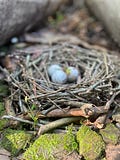The Art of Weaving Genres
How James Crews combines essay, poetry and writing invitations in Unlocking the Heart
“I believe that telling our story, even the story of a moment, the story of an emotion, is one of the most healing things we can do.” —James Crews, poet and workshop leader
Preview: Emerging Form Episode 123 with James Crews
One night, driving home from teaching a writing class, James Crews pondered on how certain poems used as examples really opened creative doors for his students. Eight years later, he published Unlocking the Heart: Writing for Mindfulness, Courage and Self-Compassion. In this episode, we talk about his hybrid approach weaving poems, essays and writing prompts. We talk about how titles and first lines can work as “an inviting wave into the house of the poem.” We discuss how to write poems “anyone can enter,” why writing can be “the ultimate healing practice,” and how reading certain poems can inspire our own practice. James says, “When a poem can unlock the door for us, it makes us think I want to try that. We can access that mysterious place and give form to feeling.”
James Crews is the editor of several bestselling books, including The Path to Kindness and How to Love the World, which has over 100,000 copies in print. He has been featured in The Washington Post, The Boston Globe, The New York Times Magazine, The New Republic, The Christian Science Monitor, and on NPR’s Morning Edition. The author of four prize-winning books of poetry and of the book Kindness Will Save the World, James also speaks and leads workshops on kindness, mindfulness, and writing for self-compassion. He lives with his husband on forty rocky acres in the woods of Southern Vermont. AND The Wonder of Small Things just won the New England Book Award for Poetry! He also hosts a monthly writing community and sends out a weekly newsletter.
What We’re Reading and Listening to:
Rosemerry:
You won’t be surprised that I am gobsmacked once again by VOCES 8, this time by “Stardust,” composed by Taylor Scott Davis with text by Clairel Estevez. Rubby harmonies and soaring interweavings … Oh. My. Gawsh.
I love when poems can speak to the every day and find the mysterious in that moment, how we fall into experiencing our life in many layers … as in this poem, “A Morning,” by Mark Strand.
I am stunned by how much I love this short exploration on the joy of creating things with others … and what just one ordinary person can do with their life.
Christie:
Elizabeth Strout has a new book out, Tell Me Everything, and I was lucky enough to get it from my library. This is another novel, set in Maine, about the lives of Lucy Barton and Olive Kitteridge, but Bob Burgess is the real star. It’s hard for me to explain the appeal of Strout’s novels, except that they’re about the imperfect lives of ordinary people and how they get through. Two themes emerge: Everyone is broken in some way, Bob tells his brother. And “Love comes in so many different forms, but it is always love,” Lucy says.
I learned about Suddenly By Isabelle Autissier, Translated by Gretchen Schmid thanks to Katie Hobson’s Three Great Books Substack. It’s a fast-paced novel about Louise and Ludovic, a young couple from Paris who are off on a grand adventure sailing around Cape Horn. They make the fateful decision to explore a small deserted island for a day, even though the public is explicitly forbidden from visiting. Things go wrong and they end up stranded with no provisions in a place no one will look for them. What happens next is a story about how relationships are tested by a life-or-death crisis, the choices people make in such circumstances and the power of narrative to shape truth. The novel evokes a very strong sense of place, and there’s an interesting thread near the end about choices journalists can face when reporting on sensational stories. In short, I enjoyed it.
Useful
This is my one prayer,
one intention carried
in the clay of skin:
to be a useful cup
fired in the kiln of life.
Cracked as I am, shaped
by flawed but caring
human hands, let me hold
what is mine to hold,
then give it back,
transformed by the keeping,
to anyone thirsty enough
to receive it.
—James Crews
A Note About Paid Subscriptions:
First, we want to thank ALL our subscribers! We are so grateful you join us in this conversation about what it is to engage with yourself, the world and others in a creative way. And a BIG thank you to our paid subscribers. You make this podcast possible. Starting this month, only our paid subscribers will receive our bonus episodes as a thank you for their financial support.
This week, James Crews reads a poem, essay and writing invitation from his new book, Unlocking the Heart, and we discuss losing our attachment to outcome for our art, what constitutes a creative act, and how to preserve our creative practice in the face of success. If you are not yet a paid subscriber, you can go now to our website, EmergingForm.substack.com, or by clicking the button below. Thank you!
Two Questions:
(share your answers with us here on Substack or in our FB group)
How has success impacted your creative practice?
What is the relationship between courage and creativity?
Emerging Form is a reader-supported publication. To receive new posts and support our work, consider becoming a free or paid subscriber.



